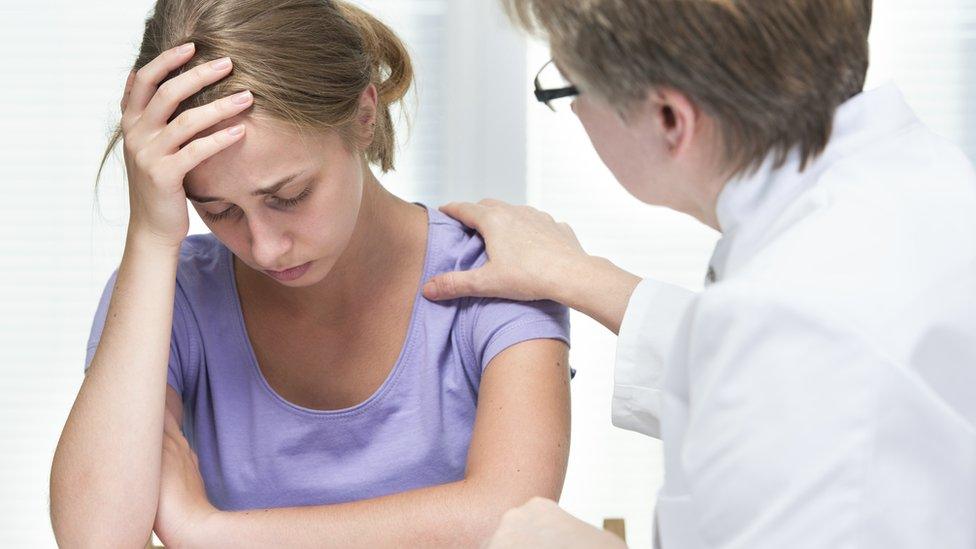What is mental health?
- Published

Everyone has mental health. It involves our emotional, psychological, and social well-being, and it affects how we think, feel, and act.
It also helps determine how we handle stress, relate to others, and make choices.

How common are mental health problems?
One in four adults in the UK are likely to have a mental health problem at some stage in their lifetime, experts believe.
The overall number of people with mental health problems has not changed significantly in recent years, according to the mental health charity Mind.
In Europe, it is estimated that 83 million people experience a mental health condition every year.
According to statistics from the Royal College of Psychiatrists, external:
Anxiety - which involves feelings of unease, worry and fear - will affect 5% of the population at any one time
Bipolar disorder - which causes people to have manic and depressive episodes - will affect one in every 100 people
About 20% of people will become depressed at some point in their lives
One in every 150 15-year-old girls will get anorexia, and one in every 1,000 15-year-old boys
Schizophrenia - which can cause people to have hallucinations, delusions and paranoia - affects about one person in 100 people.

How do we define mental health?
Mental health problems are defined and classified to help experts refer people for the right care and treatment. The symptoms are grouped in two broad categories - neurotic and psychotic.
Neurotic conditions are extreme forms of "normal" emotional experiences such as depression, anxiety or obsessive compulsive disorder (OCD).
Psychotic symptoms affect around one in 100 and these interfere with a person's perception of reality, impairing their thoughts and judgments. Conditions include schizophrenia and bipolar disorder.

What can cause mental health problems?

The exact cause of most mental illnesses is not known but a combination of physical, psychological and environmental factors are thought to play a role.
Many mental illnesses such as bipolar disorder can run in families, which suggests a genetic link.
Experts believe many mental illnesses are linked to abnormalities in several genes that predispose people to problems, but don't on their own directly cause them. So a person can inherit a susceptibility to a condition but may not go on to develop it.
Difficult life events can then trigger a mental illness in a person who is susceptible.
According to the charity Mind the following factors could potentially trigger a period of poor mental health:
childhood abuse, trauma, or neglect
social isolation or loneliness
experiencing discrimination and stigma
the death of someone close to you
severe or long-term stress
unemployment or losing your job
poverty or debt
homelessness or poor housing

What are the most common disorders?

Anxiety and depression are the most common mental health disorders in the UK, experts have recorded.
In the annual health survey for England, depression was the most frequently reported mental illness, with nearly one in five (19%) people saying they had been diagnosed with the condition.
Official data collected by the Health and Social Care Information Centre categorises common mental health disorders as phobias, panic attacks, post-traumatic stress, post-natal depression and obsessive compulsive disorder.
Conversely, serious disorders are illnesses such as bipolar disorder, eating disorders, nervous breakdowns, personality disorders, psychosis and schizophrenia.

How do you detect a mental illness?
A mental illness can not be tested by checking blood or body fluids. Instead it is diagnosed, usually by an experienced psychiatrist or clinical psychologist, after studying a patient's symptoms and monitoring them over a period of time.
Many different mental illnesses can have overlapping symptoms, so it can be difficult to tell the conditions apart.
To diagnose a mental health condition, psychiatrists in the UK may refer to the World Health Organisation's International Classification of Diseases, external (ICD) system. This lists known mental health problems and their symptoms under various sub-categories. It is updated around every 15 years.
For common problems such as depression and anxiety, your GP may be able to give you a diagnosis after one or two appointments.

Mental health self-assessment
Find out if you should be seeking help by answering a few short questions.
If you are having trouble understanding any of these questions, or at any point you start to feel distressed, please stop and seek the advice of a medical professional. See the links below for organisations that may be able to help you.
NHS Choices: Stress, anxiety and depression, external
Mind, the mental health charity, external
About the self assessment: The first eight questions are taken from a measure known as the Patient Health Questionnaire 9 or PHQ-9, used by doctors to assess and monitor depression severity. The PHQ-9 was developed by Dr Robert L Spitzer, Dr Janet B W Williams, Dr Kurt Kroenke and colleagues, with an educational grant from Pfizer Inc.
Other links for information and support are available on BBC Action Line

How is it treated?
The two most common forms of treatment offered through the NHS are either talking treatments or medication.
Talking therapy involves talking about problems with a trained professional. These problems are usually linked to your mental and emotional health.
A technique known as cognitive behavioural therapy (CBT) is widely available on the NHS. CBT focuses on the "here and now". CBT looks at how 'automatic' thoughts can affect how you feel, and aims to change these.
Psychotherapy is another type of talking therapy, and it typically focuses on your early relationships and experiences and how they impact on current relationships.
In terms of medication the four main groups of pills include antidepressants, benzodiazepines, antipsychotics and mood stabilisers.
Antidepressants are usually prescribed for anxiety and depression as are benzodiazepines.
Meanwhile, antipsychotics affect a number of chemicals in the brain called neurotransmitters - according to the Royal College of Psychiatrists these are chemicals which brain cells need to communicate with each other. Dopamine is the main neurotransmitter affected by these medications.
Recommended treatments for different conditions usually follow official clinical guidelines issued by the National Institute for Health and Care Excellence (NICE).

In The Mind - a series exploring mental health issues

In The Mind:, external BBC News special report (or follow "Mental health" tag in the BBC News app)

- Published15 January 2016
